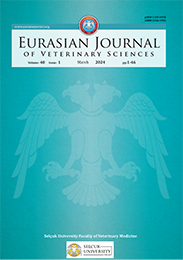| 2012, Volume 28, Number 1, Page(s) 047-053 |
| [ Summary (Turkish) ] [ PDF ] [ Similar Articles ] |
| Effect of meloxicam on serum vitamin and cytokine levels during endotoxemia |
| Akile Ozlem Yurt |
| Konya SGK Central Directorate of Health Affairs, Konya, Turkey |
| Keywords: Meloxicam, endotoxemia, vitamin, cytokin |
| Downloaded:1376 - Viewed: 2614 |
|
Aim: The aim of this study is to evaluate the effects of
meloxicam on serum vitamin and cytokine levels during
lipopolysaccharide-induced endotoxemia. Serum biochemical
concentrations were also evaluated.
Materials and Methods: Fifty male adult Sprague Dawley rats were used in this research. Five rats were reserved to obtain 0 time data then the rest were divided into 3 equal groups. First group received lipopolysaccharide (4 mg, intraperitoneal), second group received meloxicam (50 mg/ kg, intraperitoneal) and third group received lipopolysaccharide (4 mg, intraperitoneal) plus meloxicam (50 mg/kg, intraperitoneal). Blood samples were collected at 2, 4 and 8 hours after administrations. Serum retinol, β-carotene, vitamin C, interleukin-1α, interleukin-1β, interleukin-2 and routine biochemical values were measured. Results: After lipopolysaccharide administration, decreased β-carotene level (p<0.05) was inhibited by meloxicam while increased interleukin-1α level (p<0.05) could not. Lipopolysaccharide caused increase in damage indicator levels of heart, liver, kidney besides cholesterol and triglyceride (p<0.05) while meloxicam administration was inhibited increase in creatine kinase-MB and cholesterol levels but caused more increase in urea and triglyceride levels. Conclusion: Meloxicam may be useful in inhibiting vitamin loses and heart damage. In addition, non-steroidal anti-inflammatory drug and vitamin supplementation may be useful during acute phase of endotoxemia. |
| [ Summary (Turkish) ] [ PDF ] [ Similar Articles ] |




